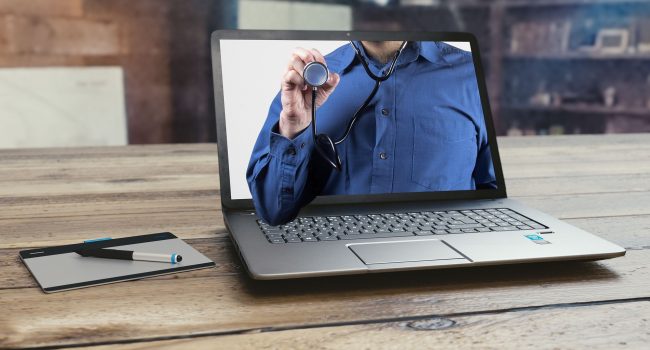Telehealth

This Doctor Always Makes House Calls!
What is telemedicine?
Telemedicine is the practice of medicine using technology to deliver care at a distance. A physician in one location uses a telecommunications infrastructure to deliver care to a patient at a distant site.
What is telehealth?
Telehealth refers broadly to electronic and telecommunications technologies and services used to provide care and services at-a-distance.
What’s the difference?
Telehealth is different from telemedicine in that it refers to a broader scope of remote health care services than telemedicine. Telemedicine refers specifically to remote clinical services, while telehealth can refer to remote non-clinical services.
What is telehealth?
Hearing a lot about telehealth and telemedicine lately? Connecting with your health care provider online is a great way to get the health care you need from the comfort and safety of your own home.
What does telehealth mean?
Telehealth — sometimes called telemedicine — lets your health care provider provide care for you without an in-person office visit. Telehealth is done primarily online with internet access on your computer, tablet, or smartphone.
There are several options for telehealth care:
- Talk to your health care provider live over the phone or video chat.
- Send and receive messages from your health care provider using secure messaging, email, secure messaging, and secure file exchange.
- Use remote monitoring so your health care provider can check on you at home. For example, you might use a device to gather vital signs or other vitals to help your health care provider stay informed on your progress.
What types of care can I get using telehealth?
You can get a variety of specialized care through telehealth. Telehealth is especially helpful to monitor and improve ongoing health issues, such as medication changes or chronic health conditions.
Your health care provider will decide whether telehealth is right for your health needs. Ask your health care provider’s office what your telehealth options are, especially if you are concerned about the health risk of COVID-19.
Care you can get with telehealth
- Lab test or x-ray results
- Mental health treatment, including online therapy, counseling, and medication management
- Recurring conditions like migraines or urinary tract infections
- Skin conditions
- Prescription management
- Urgent care issues like colds, coughs, and stomach aches
- Post-surgical follow-up
- Treatment and follow-up appointments for attention deficit disorder (ADD) and attention deficit hyperactivity disorder (ADHD)
- Physical therapy and occupational therapy
- Remote monitoring services that help you track your health goals and manage chronic conditions like diabetes, high blood pressure, and high cholesterol
Tip: Are you new to telehealth? Get tips and information on the basics of telehealth.
Your health care provider may also ask you to send information that will help improve your health:
- Your weight, blood pressure, blood sugar, or vital information
- Images of a wound, or eye or skin condition
- A diary or document of your symptoms
- Medical records that may be filed with another health care provider, such as X-rays
Health care providers can send you information to manage your health at home:
- Notifications or reminders to do rehabilitation exercises or take medication
- New suggestions for improving diet, mobility, or stress management
- Detailed instructions on how to continue your care at home
- Encouragement to stick with your treatment plan
Benefits of telehealth
Virtual visits are growing in popularity. Though in-person office visits may be necessary in certain cases, there are many benefits of telehealth care.
- Limited physical contact reduces everyone’s exposure to COVID-19
- Virtual visits ensure you get health care wherever you are located – at home, at work or even in your car
- Virtual visits cut down on travel, time off from work, and the need for child care
- Virtual health care tools can shorten the wait for an appointment
- Increased access to specialists who are located far away from your hometown
Telehealth is not a perfect fit for everyone or every medical condition. Make sure you discuss any disadvantages or risks with your health care provider.



